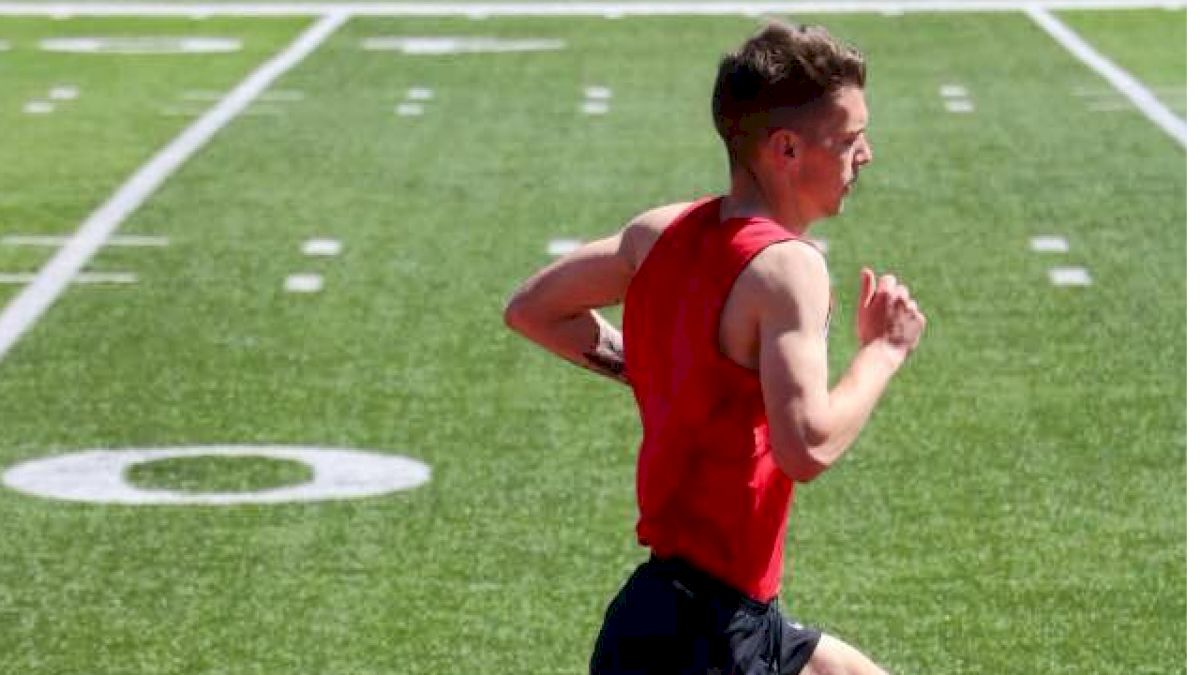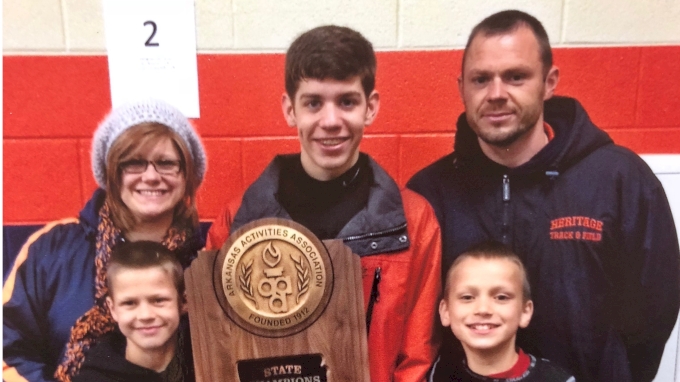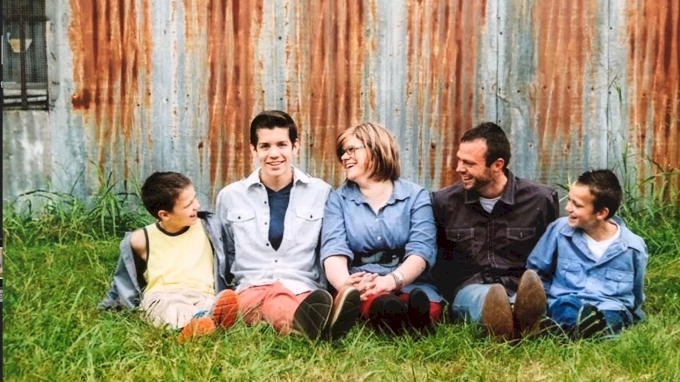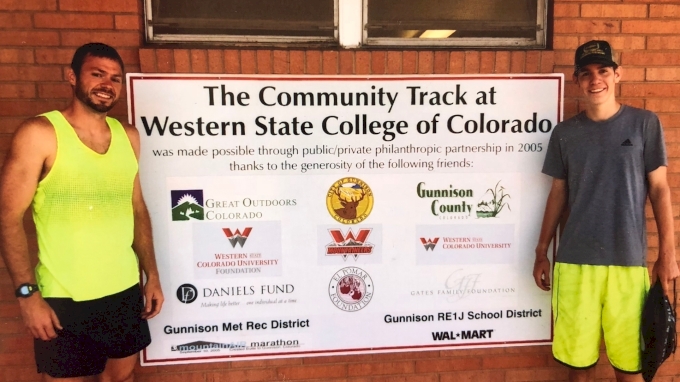Woodrow Murray-Wood: A Runner's Journey To Find His Family
Woodrow Murray-Wood: A Runner's Journey To Find His Family
Western Colorado runner Woodrow Murray-Wood has come a long way to become a top runner for the Division II powerhouse.

Lee Wood knew the runner who had just finished third in a middle school 800m race. He wanted to talk to him.
Wood, then the Rogers Heritage High School distance coach, had watched attentively as the Lingle Middle School eighth grader circled the track in one of the slower heats that day at a quiet meet in Rogers, Arkansas. He was impressed with the kid’s stride, and despite Woodrow Murray running an unspectacular time, the coach wanted to tell him that he had real potential as a runner.
Wood also hoped to encourage Murray after his race because he figured if he didn’t, there was a chance nobody else would. Years before, Wood had met a 10-year-old Woodrow Murray when he worked at the Rogers Activity Center, back when Murray was a rough-edged kid with a reputation for starting trouble at the community center along with his siblings.
Wood had seen the young Murray plenty in his time as the sports programs director at the center in Northwest Arkansas, during which he would come to learn that the exterior self Murray presented was his way of protecting a damaged interior.
By the time coach Wood saw Murray run that 800m race, he already knew some of what the teenager had spent his entire childhood trying to hide: that Murray had a deeply-troubled home life rooted in an absent father and his mother’s drug abuse and neglect.
Knowing Murray’s history, and remembering that not too long before he was the kid at his community center clearly desperate for any attention, Wood felt compelled to say something.
So he approached Murray that day in 2010 with a sentiment he hoped would motivate him to stick with the sport, a quick way for Wood to let the middle schooler know that somebody had appreciated his performance.
“He knew who I was, I had my high school coach’s shirt on. He knew who I was, and I said, ‘Man, you’ve got a great stride. You could be worth something in running,’” Wood told FloTrack.
Neither Wood nor Murray had any way of knowing then that their short interaction at the track meet would change both of their lives forever.
“Maybe he didn’t even know how big of a moment that was and maybe I didn’t either, but that was definitely just a doorway to the family that I’m in now and the place that I’m in now,” Murray said.
It was only years later, when Wood and his wife, Sara, were dropping Murray off at college at the University of Central Arkansas, that Murray confided in Sara that the compliment he had received that day back in middle school from Wood was the first of any kind in his life.
‘Something Was Different’
Looking back on that pivotal moment from eight years ago, Woodrow Murray-Wood, who changed his name after Lee and Sara adopted him, can draw a direct line from his interaction with Wood to the person he is now: a senior runner on the Western Colorado men’s cross country team and a son to Lee and Sara Wood.
But Murray-Wood’s journey to becoming a collegiate athlete and a member of the Wood family was an arduous one that required him to let down the guard he had built up around his emotions, and begin to heal from a childhood in which he had been mostly ignored by those closest to him.
When Wood eventually became his high school cross country coach and started inviting Murray-Wood over to dinners with his family, the deep scars from a dysfunctional home life made it hard for the teen to embrace their affection.
Running may have helped him find the doorway to a new life, but walking through it would prove to be a significant challenge for Murray-Wood. Even when dinners at the Wood house turned into him coming over more and more frequently, it was difficult to fully give himself over to them at first.
Years of suppressed emotions don’t wash away that easily.
“I still remember the first time that my mom now told me she loved me,” Murray-Wood said. “I didn’t know how to respond. I knew (if) somebody says I love you, you’re supposed to say I love you too, but I really couldn’t.”
Children who grow up in neglectful homes can often cite the exact moment they realized their situation didn’t fit the normal mold, and for Murray-Wood that moment came when he was in sixth grade. A teacher pulled him aside and asked him if he smoked cigarettes, noting how strongly he smelled of them.
“Cigarette smoking was the least of the problems in my house. But that was like the first time I noticed that other people were noticing that something was different about me,” said Murray-Wood.
Murray-Wood was the second-youngest of seven siblings growing up in a house along with his mother, whose dependency on drugs and prescription pills took priority over giving her children the physical and emotional attention they desperately needed. Her struggles frequently left him and his siblings scrambling to have basic needs met; Murray-Wood remembers a time when he waited up until midnight for the family’s food stamps to arrive, counting down the minutes until his mother could go to the grocery store to fill cabinets that had been empty for days.
“I remember specifically there was a period — it was probably a week and a half — where we didn’t really have anything. Towards the end of that week and a half, there was literally no food in the house,” he said.
“There was definitely times that we went to bed hungry.”
A Place To Stay
At track practice during Murray-Wood’s ninth-grade year at Heritage, coach Wood could tell that the young runner needed help.
He started by inviting Murray-Wood to church, which was closely followed by the freshman coming over to his house for dinners throughout the week. It was obvious to Wood that his track athlete wasn’t getting proper nutrition at home, so he welcomed him to join his wife and his two sons for a meal whenever he wanted.
A few dinners a week turned into a few more until Murray-Wood was a constant presence at the Wood house. Still, though, the teen was at first hesitant to open up around the family. By age 15, Murray-Wood had long-since been conditioned to bottle up whatever affection his emotional self needed, a bitter side-effect of a childhood spent without parental care, which made it impossible for him to immediately flip a switch to fully embrace a family — one that wasn’t his own — who seemed to love him unconditionally.
“It was really hard to accept being loved and supported, because coming from the family that I did, it just wasn’t there,” he said. “So emotionally for me I was pretty closed off. I just wasn’t very accepting of it at first.”
But after seeing the way Lee and Sara Wood doted on their sons, and feeling himself wanting that same love, Murray-Wood gradually became more comfortable trusting them and accepting their nurturing. He could relax and be a kid in their home.
Many evenings at their house, he would end up falling asleep on the couch after dinner, only waking at 10 PM when coach Wood would drive him back to his mother’s house. The Woods were growing to adore having Murray-Wood around as much as he wanted, and they cherished seeing him interact with their two boys, but he still had to go home each night. Dysfunctional or not, Wood had an obligation to bring a son home to his mother every night.
For the coach, this frequent ritual provided another glimpse into the deep-rooted shame Murray-Wood harbored. When they got close to the house, Wood would stop the car ahead of the long, dirt road that led up to the home, at which point Murray-Wood would hop out and walk the rest of way to his front door.
Though they had become increasingly close during the runner’s freshman year, Murray-Wood still didn’t want his coach to see the run-down house he lived in.
Escape
Before he even started coming over to the Wood house as a freshman, running had already become an outlet for Murray-Wood to blow off frustrations and put all his negative energy into something positive. He wasn’t a particularly strong runner then, but with his coach’s encouragement, he came out for cross country as a sophomore after skipping it his freshman year.
Murray-Wood took his lumps that season running on the JV cross country squad at Heritage, as he was behind in fitness and low on confidence, but by track season of his sophomore year the sport was starting to click. The times weren’t quite there yet, but his commitment was evident: during that sophomore winter, athlete and coach would shovel snow off of lane one at the high school track so that Murray-Wood could get in some speed work.
With a sophisticated training plan from coach Wood and a growing confidence in his ability as a runner, Murray-Wood took off in his final two high school seasons. A 31st-place finish as a junior at the Arkansas state cross country meet was followed by a 30th-place showing the following season, and by the time his prep career was wrapping up, Murray-Wood owned school records in the outdoor 800m (1:59.53) and 1600m (4:29.38). He had also helped Heritage win state titles both indoor and outdoor.
Murray-Wood and family after Arkansas state meet in 2013:

From where he had been just two years before in cross country, unable to break 19 minutes for 5K while still struggling to believe in himself, Murray-Wood had come an unbelievably long way both physically and mentally.
A big reason for all that improvement had come in July of 2012, the summer between his sophomore and junior year, when a permanent change was made to his living situation: Murray-Wood’s mother signed over legal guardianship to Lee and Sara then, which meant he could live with them full-time and start to become a part of their family.
The move provided significant stability for Murray-Wood, and for the Woods; it meant that the child they had grown to love like one of their own no longer had to worry about being taken care of.
‘Who You’ve Been Waiting For’
Well before the teen moved into their home officially during the 2012 summer, Lee and Sara Wood knew that they wanted Murray-Wood to be in their family.
Way back during his days working at the Rogers Activity Center, Wood had frequently spoken with his wife about the 10-year-old kid who was causing trouble at the rec center, so Sara knew who he was and knew about the living situation he was struggling in even before she met the teen at church one Wednesday evening. Wood had invited his freshman track athlete to attend the service with his family, and it marked the first time Sara would meet the boy who would become her son six years later.
Sara knew her husband cared about the kid he had seen struggle over the years, but as they drove that night to the service, one particular comment from him really caught her attention.
“Lee was telling me about him, and (he) said, ‘I’m excited for you to meet him.’ And I said, ‘Yeah, I’m excited to meet him too!’ Sara said. “Lee said, ‘I’m telling you if I could, I would adopt that kid.’”
Knowing that her husband wasn’t one to exaggerate, that comment floored Sara. She felt her heart jump with both surprise and excitement about the words she had just heard, and Sara suddenly sensed something big was about to happen.
Wood family photo:

The Woods already had two sons at that point, but for a long time the couple felt like their family wasn’t entirely whole. They had wanted more children, but Sara had suffered two late-term miscarriages back-to-back that marked by far the most difficult period of her life. She leaned on her Christian faith heavily during the time around her miscarriages, not understanding why two babies she had wanted so dearly had been taken from her. But still, Sara just knew that she was meant to be a mother to another child. So she prayed.
Sara believes the answer to that prayer came on that Wednesday night at church when she first met Murray-Wood. As she stepped out of the car and laid her eyes on him for the first time, it took everything for her not to run up immediately and hug the boy. She didn’t, but Sara could feel in her heart a sudden joy that had been missing since her miscarriages. She had believed God was promising her another child, and this was her sign that that promise would be fulfilled.
“When I saw him, it was just like my heart said, ‘This is it. This is who you’ve been waiting for,’” Sara said.
Finding A New Home
A family vacation in Colorado during the summer of 2015 brought the coach and his soon-to-be son to the campus of Western Colorado for the first time. Murray-Wood had been living with the family for three years then, but he was about to leave home to start his freshman season on the University of Central Arkansas cross country team. Wood was still coaching at Heritage, and at that point neither was seriously considering Gunnison, Colorado, as anything other than a really cool place to run. That day they just wanted to check out the Western track and run a workout there, at a spot 7,700 feet above sea level. So they did, and Sara and the two younger boys tagged along.
The Woods had seen Murray-Wood grow tremendously in the three years he had been living with them. Not only had he developed into a solid runner with admirable PRs, but the boy who was raised without any nurturing and attention had learned to give and take love. The Woods' sons, Hunter and Braden, now viewed Murray-Wood as a role model. And the kid who had struggled at first to return Sara’s “I love you's” was now encouraging her to embrace her baldness as she dealt with alopecia, the autoimmune condition that causes hair loss.
Murray-Wood had changed a lot in the three years he had been living with the Woods, and the family that was once four knew how much happier they were because of it. Even then, Murray-Wood was still learning to fight back against his self-doubt, and it showed after that workout.
When Sara proposed a dream scenario in which Wood and he could be coach and athlete again, this time at Western Colorado University, Murray-Wood wasn’t having it.
Dad and son after their workout at the Western Colorado track in 2015:

Knowing how good the Mountaineers had been at the Division II level for decades, Murray-Wood immediately shot down any notion that he would ever be good enough to run for the team.
“I remember I said, ‘Oh man, it would be so cool if you ran here and Dad coached here,’” Sara recalled.
“I remember Woodrow said, ‘Oh, I’d never be good enough to run here. I’ll never be good enough to run here.’ I said, ‘Come on now. Have faith in yourself! Of course you’re good enough to run here.’”
But still he insisted.
“But he was like, ‘No way. Mom, I’ll never be good enough to run here.’”
It’s been over three years since then, and for Sara, what’s happened in those three years is yet another testament to the growth she’s seen in his life.
In July of 2017, coach Wood felt that he was being called to move out to Gunnison, a place that he and his family had fallen in love with two years earlier. The coach didn’t have a job yet, but he decided to make the move on a leap of faith. Murray-Wood had just finished his second year at Central Arkansas, but he too decided to make the move after a discussion with his family.
He had run 3:59 in the 1500m by then, and his plan was to join the Western Colorado team, the same one that he had refused to believe he was good enough for just two years prior.
“To think of who he felt like he was then, and who he knows he is now, just the confidence that he has,” said Sara.
Another remarkable thing happened after that. As Wood-Murray took his visit to Western Colorado that summer, Wood tagged along, and at the end of the meeting decided he would mention to Western head coach Jennifer Michel that he was an experienced distance coach looking for work. Wood was pleasantly surprised to learn from her that another assistant had just left, and a job had opened up.
Two months later, Lee Wood became an assistant at Western Colorado, joined at practice by the team’s newest walk-on. A dream that had seemed too far-fetched to imagine was now reality.

Today, Murray-Wood is one of the top runners on the fourth-ranked Western team, who are gunning for a spot on the NCAA podium later this fall.
January 16, 2018
By the time the day arrived for Woodrow Murray to officially become a son to Lee and Sara Wood and change his name to Woodrow Murray-Wood, he had been living with the family for nearly six years. The final paperwork to seal the adoption was just a formality for the 21-year-old and his family at that point.
But January 16, 2018, was nonetheless a transformative day for Murray-Wood and his parents. Their journey to that snowy Gunnison courthouse had been rife with challenges, and all acknowledge that getting there was incredibly tough. The Woods had to learn how to parent a teenager on the fly, one that had lived 15 years outside of their home. Murray-Wood had to learn to accept their love and trust that it wouldn’t run out. All had to rely on their faith constantly.
Those things took years, and that’s why reaching the finish line at that courthouse — the one near their new home in the new city where they had all moved together — was so special.
The Woods at the Gunnison Courthouse on adoption day:

“We knew we were a family, but it was like some closure,” Wood said.
For his birthday this year, Murray-Wood knew exactly what he wanted: a new tattoo. The boy who grew up unsure of what to make of his place in the world and afraid to show any emotions had officially arrived at where he was meant to be, and he wanted to have a permanent reminder of the moment that finally happened.
In Roman numerals, Murray-Wood has the date of his adoption — January 16, 2018 — inked on his skin.
“He said, ‘That’s the day. That’s the day I became,’” said Sara.